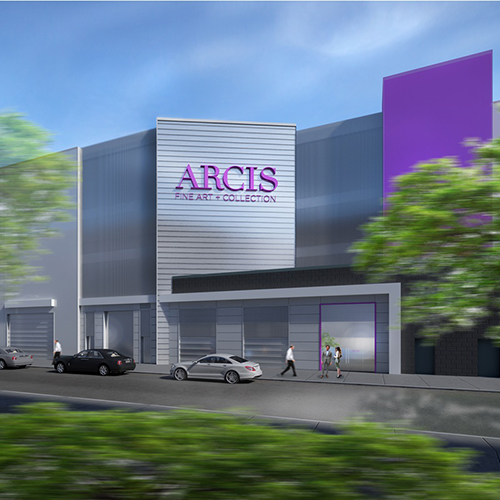Will New York Get Its Own Freeport for Art? ARCIS Plans a Tax Haven in Harlem
A freeport on par with Geneva and Singapore.
A rendering of the Arcis art storage facility, a freeport, under construction in Harlem. Courtesy Arcis.
Is Harlem set to become the new Geneva?
In what will undoubtedly be music to the ears of art buyers all over the world—and alarm bells to those feel the super-wealthy already enjoy too many tax loopholes—New York City, the veritable capital of the art world, may be about to get a state-of-the-art storage facility with “foreign trade zone” (FTZ) status, aka a “freeport.” Due to open for business this summer, the fortress-like facility will be located on 146th street.
Like similar freeport options already in place in Singapore, Geneva, and, more recently, in Delaware, no tax is due on the artwork for as long as it is stored in the facility, though applicable taxes are due in the respective location the work eventually ends up in for display or ownership. (The FTZ designation is “the United States’ version of what are known internationally as free-trade zones,” according to the US Customs and Border Protection website.)
“Many, many things are sent to Switzerland to get them out of the United States in order to get certain benefits against the value,” said Kevin Lay, who is helping spearhead the project. “Collectors can have the benefit of saving on shipping.”
There is no time limit on storage at the new facility, which is under construction by storage company ARCIS in Harlem.
Lay is a former executive of Crozier Fine Art, and spearheaded the expansion and relocation of Fergus McCaffrey’s gallery to Chelsea from the Upper East Side. The new project is also the brainchild of another veteran of the art storage and shipping business, Tom Sapienza, former CFO of Crozier Fine Arts and co-founder of Crozier US Holdings LLC, Crozier Long Island LLC, and Crozier Decorative Arts, LLC.
The duo were recruited by art collector and real estate mogul Ken Cayre. Further, they consulted with executives at the Van Gogh Museum in Amsterdam—under the museum’s new business services branch—for advice on creating a state-of-the-art secure facility that includes cutting-edge air-filtration systems, retinal scanning, and access control.
In a phone interview, Sapienza and Lay explained to artnet News that the building project involved crash courses in thermal dynamics, getting up to speed with the gold standards of international construction guidelines (including from the Association of Heating Refrigeration and Air Conditioning Engineers, or ASHRAE), and installing an air-filtration system that guards against dust and other contaminants. They are also pursuing both LEED and BREEAM certificates for the building.
Sapienza referred to the FTZ status as “the icing on the cake,” but we imagine collectors will beg to differ. For wealthy art buyers with high-priced works, having a tax refuge of this kind conveniently located in New York City is the cake.
Particularly in New York City where the cumulative sales and use tax on art is 8.75 percent, collectors will likely welcome the ARCIS storage option with open arms, if not downright exuberance.
As artnet News reported, the Manhattan District Attorney, in early 2015, embarked on another of its periodic investigations of art sales tax and crackdowns on art-related tax avoidance. A few months ago, collector Michael Shvo was charged with tax evasion on purchases of art and other luxury goods and was released on $500,000 bail.
How did the facility get authorized? “ARCIS presented a proprietary business model for fine art and cultural property storage to U.S. Customs and Border Protection, and to the U.S. Foreign Trade Zones Board for a Manhattan FTZ, that would compete with the FTZs abroad,” said Sapienza.
Asked whether ARCIS expects similar FTZ businesses for art cropping up, he explained the barrier to entry makes that unlikely in the near term.
“The process was a complicated and lengthy one which lasted roughly 20 months from initial research to federal designation,” he said. “I don’t see any other operator in Manhattan coming to market with our management qualifications and a ground-up sustainable construction designed to museum-level specifications ready to pursue FTZ designation from the U.S. Customs and Border Protection, and the U.S. Foreign Trade Zones Board.”
Follow artnet News on Facebook.
https://news.artnet.com/art-world/will-new-york-get-its-own-freeport-for-art-arcis-plans-a-tax-haven-in-harlem-878165
